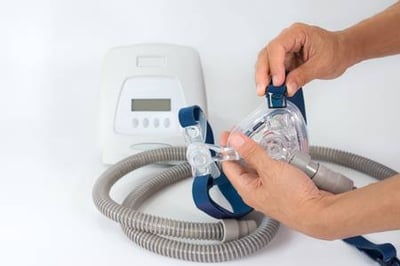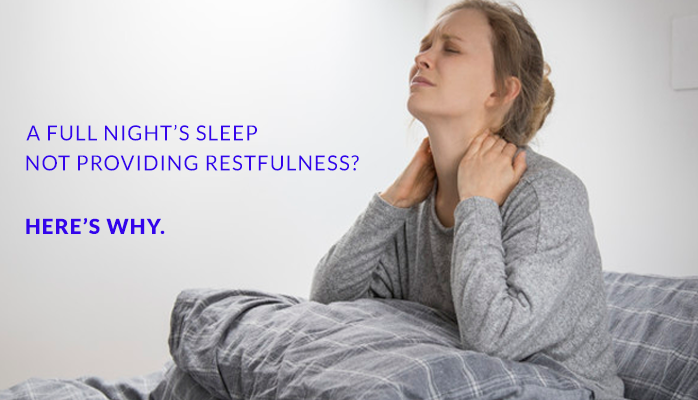There are two kinds of sleep: restful and unrestful. During restful sleep, you wake up feeling refreshed after a full night of several, uninterrupted, sleep cycles. During unrestful sleep, you may toss and turn all night, wake up several times, and wake up feeling as if you could sleep for another three hours. Regardless of how many hours you spend in bed if your sleep is not restorative, then you are still not achieving the amount of sleep that you need for optimal functioning.
If you wake up feeling like you hardly slept, even if you were in bed with your eyes closed all night, it’s going to inhibit your ability to enjoy life – you’re going to be tired all the time. When you are tired all the time, you are crabbier, perform worse in nearly every task, lose motivation to do things for yourself or with others, have a reduced sex drive, etc. Life is simply less full when you have chronic fatigue.
It’s frustrating. You feel like you should be rested and happy because you've had a full night's sleep. This phenomenon is generally a strong symptom of either of the following:
- Bad habits and/or cognitive conditions
- Sleep disorders
- Bad sleeping environment
- Medical problem
Common Medical Causes of Fatigue
Some relatively common medical conditions can make you tired all the time, even though you are getting eight or more hours of sleep. These include:
- Hypothyroidism
- Hormone problems
- Diabetes
- Anemia
- Heart Disease
- Chronic illness
These medical conditions can leave you feeling drained of energy, and enthusiasm, and make you feel like you could “sleep a year.” With such conditions, you might range from feeling chronically fatigued to feeling like you happily put your head down and sleep at any time, to being so disruptive you can hardly function normally.
Sleep Conditions That Cause Fatigue
One of the more common reasons you are tired all the time even after 8 hours of sleep is that you have a sleep disorder. Sleep disorders are conditions that prevent you from getting quality sleep. Here are a few sleep disorders that would give you the illusion of sleeping throughout the night, but don’t provide quality sleep.
 Sleep apnea is a sleep disorder and medical condition that causes you to repeatedly stop breathing constantly throughout the night, anywhere from 40 to over 100 times per night, and wake up to resume breathing (though you won’t remember waking). Therefore, you might sleep 8 hours and still feel like you barely slept – because you didn’t sleep! It causes severe sleep deprivation and the following symptoms:
Sleep apnea is a sleep disorder and medical condition that causes you to repeatedly stop breathing constantly throughout the night, anywhere from 40 to over 100 times per night, and wake up to resume breathing (though you won’t remember waking). Therefore, you might sleep 8 hours and still feel like you barely slept – because you didn’t sleep! It causes severe sleep deprivation and the following symptoms:
- Bed partner hears you repeatedly stop breathing throughout the night
- Loud, chronic snoring
- Wake up exhausted in the morning
- Wake up with headaches
- Waking up choking/gasping
- Mood disruptions, such as constant irritability, brain fog, etc.
Fortunately, sleep apnea is usually treated with CPAP therapy (pictured above).
Another set of sleep disorders that will leave you feeling tired after a full night’s sleep is parasomnias. Parasomnias are disruptive sleep disorders that interfere with your circadian rhythm and may impact sleep quality without your awareness of it. They include the following disorders:
- Restless leg syndrome
- Sleepwalking
- Night terrors
- Chronic nightmares
Lifestyle and Cognitive Causes of Fatigue
There are numerous lifestyle and emotional causes of poor sleep quality resulting in sleep deprivation.
- Drinking too much alcohol, which greatly impacts REM sleep
- Poor diet/malnutrition, such as allergies or intolerances that can make you feel lethargic and sluggish all of the time
- Clinical depression/anxiety
- Post-Traumatic Stress Disorder
- Shift Work
Bad Sleeping Environment Affecting Sleep Quality
Your sleeping environment is also very important for sleep quality. The following can impact your ability to achieve restful sleep:
- Not having an ideal sleeping environment: quiet, dark, peaceful, and comfortable room
- Adjust to doing shift work
- Stress/anxiety from work, marriage/divorce, moving, etc.
- Working hours that do not align with your natural circadian rhythm
- Too much “screen time” with laptops/TV/cell phones before bed, as the blue light can delay the onset of restorative stages of sleep
Any of the above can cause you to get less quality sleep even though you are getting the right amount of sleep time.
If you are living in Anchorage and struggle with chronic fatigue or tiredness during the daytime, please click the orange button below to take a free online sleep test and talk with one of our sleep health professionals.


